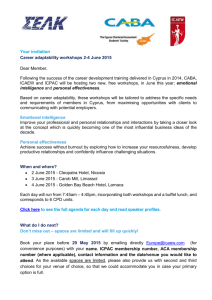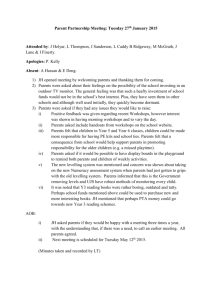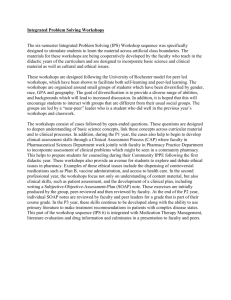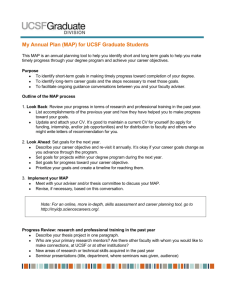Paper N.2.5 - University of Hertfordshire
advertisement
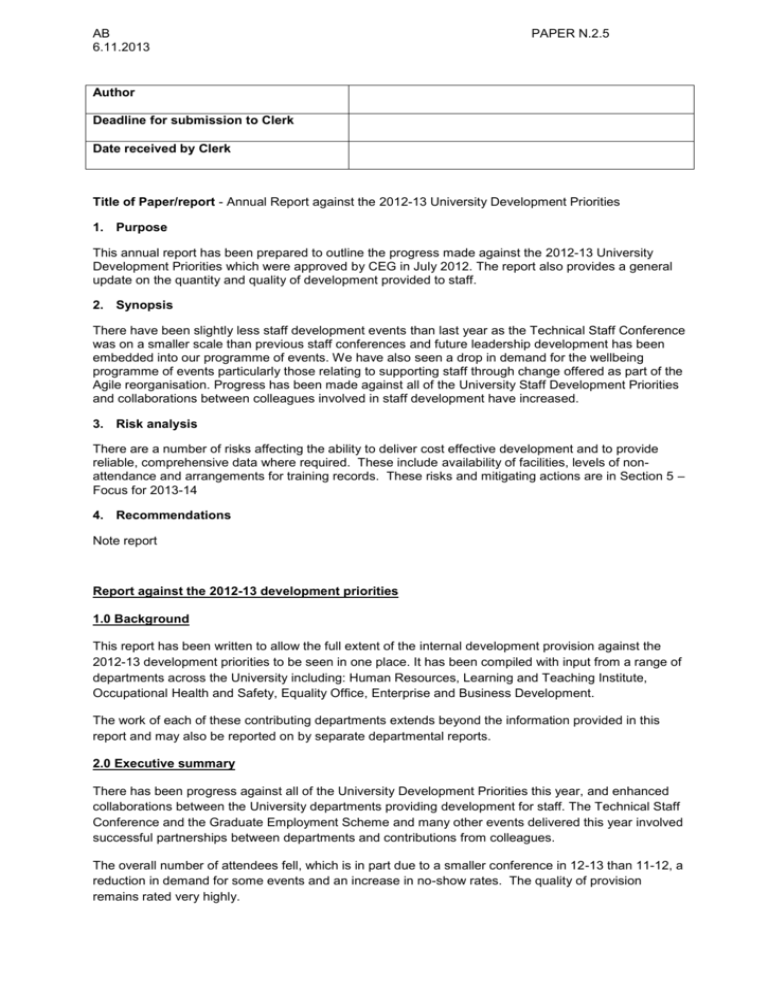
AB 6.11.2013 PAPER N.2.5 Author Deadline for submission to Clerk Date received by Clerk Title of Paper/report - Annual Report against the 2012-13 University Development Priorities 1. Purpose This annual report has been prepared to outline the progress made against the 2012-13 University Development Priorities which were approved by CEG in July 2012. The report also provides a general update on the quantity and quality of development provided to staff. 2. Synopsis There have been slightly less staff development events than last year as the Technical Staff Conference was on a smaller scale than previous staff conferences and future leadership development has been embedded into our programme of events. We have also seen a drop in demand for the wellbeing programme of events particularly those relating to supporting staff through change offered as part of the Agile reorganisation. Progress has been made against all of the University Staff Development Priorities and collaborations between colleagues involved in staff development have increased. 3. Risk analysis There are a number of risks affecting the ability to deliver cost effective development and to provide reliable, comprehensive data where required. These include availability of facilities, levels of nonattendance and arrangements for training records. These risks and mitigating actions are in Section 5 – Focus for 2013-14 4. Recommendations Note report Report against the 2012-13 development priorities 1.0 Background This report has been written to allow the full extent of the internal development provision against the 2012-13 development priorities to be seen in one place. It has been compiled with input from a range of departments across the University including: Human Resources, Learning and Teaching Institute, Occupational Health and Safety, Equality Office, Enterprise and Business Development. The work of each of these contributing departments extends beyond the information provided in this report and may also be reported on by separate departmental reports. 2.0 Executive summary There has been progress against all of the University Development Priorities this year, and enhanced collaborations between the University departments providing development for staff. The Technical Staff Conference and the Graduate Employment Scheme and many other events delivered this year involved successful partnerships between departments and contributions from colleagues. The overall number of attendees fell, which is in part due to a smaller conference in 12-13 than 11-12, a reduction in demand for some events and an increase in no-show rates. The quality of provision remains rated very highly. AB 6.11.2013 PAPER N.2.5 There has been good progress across all areas within the priorities. A particular focus within success for our students has been BME student success and progress with the Graduate Attributes. Commercial success has combined a focus on softer skills such as networking with practical support for bid writing as well as looking to enhance management and leadership skills within the research community. A particular focus under success for our staff has been supporting the technical staff community and new academic line managers both of which emerged as priority areas through the Agile reorganisation. Bringing software training inhouse has been a particular success in making progress under the effective and efficient ways of working priority. In addition the increased need to understand the broader impact of data and technology has been covered in new development sessions covering MOOCs and Key Information Set requirements. 3.0 Overall Summary of training provision The training provision covered by this report includes: Centrally administered events and workshops Targeted or bespoke sessions organised locally Completion of online training modules 3.1 Quantity Slightly fewer events have been delivered in 2012-13 compared to 2011-12. Some of the extra events during 2011-12 were to support the Agile reorganisation and the Wellbeing programme, so there was less demand for these during 2012-13. Table 1. Centrally administered events or workshops (booked through Studynet) Number of events run 365 Events Change compared to last year Number of Participants attending Change compared to last year - 48 events 4111 participants - 790 participants Table 2. Targeted or bespoke sessions organised locally In addition to the scheduled training above 2364 participants attended 166 other events provided by specialist departments at University of Hertfordshire, this breaks down as follows: Department Number of participants Number of events Research 40 40 GTR 800 60 Learning and Teaching Institute 1112 35 Health and Safety 297 21 Human Resources 115 10 AB 6.11.2013 PAPER N.2.5 Online training modules The breakdown of online training usage is as follows: Overall on-line training users 2012-13 Change compare to last year Health and Safety module users 2012-13 Equality and diversity module 2012-13 671 users + 110 users 318 users 352 users 3.2 Quality The results from our on-line evaluations continue to show that the quality of the whole development provision is high. Results from the Online evaluations: 99% of workshops had the Course Content rated as Excellent or Good 99% of workshops had the Quality of Presentation rated as Excellent or Good 98% of workshops had the Course Format rated as Excellent or Good For most of the bespoke events, LTI did not utilise formal evaluation methods, however we received very positive informal feedback from the events. 3.3 Accessibility Staff from all departments across the University attended development events this year. Chart 1 below shows the number of staff attending from each department. Non-attendance on events, either late cancellations (less than 10 day’s notice) or not attending without notice has increased from 7% to 16%. Chart 2 shows the non-attendance and late cancellations by department. The impact of non-attendance is wastage in terms of unused catering and materials and preventing other members of staff from attending events where there is a waiting list. Raising managers’ awareness of the non-attendance from their areas by reporting the figures to them has had a positive impact. AB 6.11.2013 PAPER N.2.5 Chart 1 - Attendance Attendees Students Union Physics Astronomy and Maths Office of the Vice-Chancellor Office of the CIO Not Identified Marketing and Communications Life and Medical Science Law Humanities Human Resources Hertfordshire Sports Village Hertfordshire Business School Health and Social Work Finance Estates Hospitality and Contract Services Enterprise and Business Development Engineering and Technology Education Dean of Students Office Creative Arts Computer Science Academic Registry 0 50 100 150 200 250 300 350 N.B. Not Identified - relates to participants at events who are not recorded on the HR System. These may include contractors etc. 400 450 AB 6.11.2013 PAPER N.2.5 Chart 2 – Non-Attendance Non-attendance Numbers Students Union Physics, Astronomy and Maths Office of the Vice-Chancellor Office of the CIO Not identified Marketing and Communication Life and Medical Sciences Law Humanities Human Resources Herts Sports Village Hertfordshire International college Hertfordshire Business School Health and Social Work Finance department Estates Hospitality and Contract Services Enterprise and business development Engineering and Technology Education Dean of students office Creative Arts Computer Science Academic Registry 0 20 40 60 80 100 120 N.B. Not Identified - relates to participants at events who are not recorded on the HR System. These may include contractors etc. 4. 0 Progress on key priorities Success for our students The University hosted a SaHOOTS (Students at the Heart Of Our and Their System) event that was supported by the Staff Development Forum which was well attended and included representatives of other regional H.E. Institutes. We increased our workshop provision on assessment and feedback and continued our support of flexible learning practice. Work on BME student success was a key focus this year and LTI worked closely with the Head of Equality and the Students’ Union. LTI ran a number of workshops for Schools and SBUs regarding the attainment gap between white and black; minority ethnic (BME) students. Through bespoke workshops for Schools and Professional SBUs plus the annual learning and teaching conference this crucial topic has been discussed with over 500 members of staff. AB 6.11.2013 PAPER N.2.5 Continuing the support of the promotion and implementation of the graduate attributes a bespoke workshop for the Law School was run as well as discussing the attributes with Professional SBUs including Information Hertfordshire and Human Resources. The relatively low attendance of our workshops designed specifically for experienced members of staff to help them refresh their practice and consider how to maximise student engagement within the classroom was a disappointment. It is hoped attendance will improve for 2013-14 particularly in light of the low NSS scores. Commercial success There is now a strong Marketing strategy in place for research staff with courses advertised using a variety of methods including Directors of the three Research Institutes, Associates Deans Research, and the Events for Researchers leaflet to name just a few methods. All courses were mapped to the Researcher Development Framework. Networking sessions proved popular and gave researchers the opportunity to meet new colleagues from across the University, discuss research interests and collaboration possibilities. Workshops have been run on Networking, Commercial bid writing and marketing for the Enterprise and Business Development. Staffnet pages are being developed along a similar theme to the Research Grants Office with a landing page specific to Commercial development activity. The newly established Business Development Team held a series of informal networking events to promote the opening of the new Business Development Office, LC204, College Lane Campus. A successful pilot management development programme for Research Leaders was run Dr Kevin Flinn and Dr Rodney Day. This has resulted in a new short programme called Research Leader Development which will be run in late 2013. Success for our staff The Technical Staff conference was attended by 44 technical staff from across the University. The theme of the conference was ‘Building a Technical Staff Forum’ and briefings were provided by colleagues from key functions across the University. We have supported our first set of graduate students on the Graduate Employment Scheme and pleased to report that out of those whose fixed term contracts have already completed, 100% of them have already secured further employment. This scheme is another example of cross collaboration across the University to deliver a variety of key workshops not only to the graduates but also wider staff members. “The Student Experience” and “The Higher Education Sector and the Structure at UH” provide opportunity for staff to learn more about the context within which they work. Being non-role specific they offer broad networking opportunities and were repeated due to the high interest from staff. A comprehensive programme of development has been delivered to academic staff taking on line management responsibilities as a result of the Agile reorganisation. This is aimed at supporting those staff in carrying out those duties and improving the employment experience of the staff reporting to them. Effective and efficient organisation The focus this year has been supporting staff to develop internal and external networks, understand the broader context in which UH operates and helping staff to use technology effectively as an enabler in their role. AB 6.11.2013 PAPER N.2.5 In very early September 2013 LTI held a Quality assurance and quality enhancement discussion meeting which was an external event. The meeting considered quality assurance issues associated with MOOCs and considered the impact on technology enhanced learning of the Key Information Set (KIS) requirements. 17 members of staff from the University attended the event. The software training provision has been reformatted in response to changing business needs. Training has been brought ‘In-House’ delivering short sessions which are Role/Function specific, delivered frequently and are accessible locally. The focused has been on the delivery of the fundamental functions with Excel; Word; Outlook and PowerPoint. Bespoke training has also been arranged for several user groups and Schools. In addition to the taught courses the IT development pages on StaffNet also provide useful links to free online tutorials and guides. 5.0 Focus for 2013-14 The development priorities for 2013-14 have been established and were agreed at CEG in July 2013. The Business Development Team has plans to open a new Business Development Office on the De Havilland Campus. The development providers group are committed to delivering against the priorities outlined in the 201314 priorities and providing the University with the development related support it needs to progress and succeed. The University development providers continue to meet regularly to plan delivery against these priorities, review progress and discuss opportunities to work collaboratively. In addition there are a number of risks that the group have concerns about and will be looking to take forward over the 12-13 academic year. Candidate cancellations – there is a growing concern about an increasing number of cancellations and difficulty filling some events particularly those running over a full day. Whilst in a number of cases this will only carry an opportunity cost, in other instances there may be committed costs either for catering or consultant fees. The provider’s group are taking various actions to minimise this wastage including considering the length of sessions, how they are marketed and raising awareness amongst SBU heads of the level of non-attendance from their staff. Room availability - the development providers are experiencing an increasing challenge finding suitable, available and bookable rooms to meet the programme of staff development events/workshops. This is particularly felt in relation to computer room facilities with a staff network. There is currently only 1 room that offers facilities to run training requiring access to the staff network which is causing scheduling issues to match room, facilitator and staff availability and allow sufficient time to market events. The omission of required software on PCs in the computer suite caused difficulties at the beginning of the academic year and the maintenance and updating of software is a continuing challenge. This will be monitored as it could impact on the future success for delivery of workshops and development support for staff and may lead to discussions about the need for a second staff networked PC lab. Timetabling challenges – the introduction of the new timetabling system has caused a number of small challenges including being unable to confirm academic staff facilitating workshops due to the lateness of publication, and fluctuations, of their teaching timetable. Timetable challenges also prevented/delayed some academic staff in booking onto events as they were unable to confirm their availability for sessions. It is anticipated that this will settle however it will be kept under review so any mitigating actions can be identified in a timely manner. AB 6.11.2013 PAPER N.2.5 Training records solution - Since the move from Genesis the University has not had a collated record of all training and development undertaken across its staff base, Data is extracted from Staffnet showing who has booked onto internal events and SBU heads were advised at the time that a local record would need to be kept of locally organised or supported development such as conferences attended or external training organised and paid for through local budgets. (The integrity of these local records is unknown) There are a number of reasons why the ability to provide reporting based on a collated set of data is important and the development administration team are finding that they are unable to fully or sufficiently meet a number of the requests that are being made. The development providers group have concerns in relation to the following needs particularly where the development is likely to have been provided through a mix of internal and external provision (marked*): Demonstrating to external bodies the staff development provided to various subsets of staff and how this has contributed to the enhancement of the student learning experience. In relation to teaching and learning the LTI provide data on internal event engagement but the ability to analyse this together with locally (i.e. School organised) and externally attended development is currently compromised. * Provision of data increasingly required as part of grant applications and tender bids demonstrating the commitment the University places on providing development to specific groups. * Provision of data for submissions for awards such as Athena Swann or Stonewall. * Provision of data to Professional or Statutory-Regulatory Bodies requiring details of discipline specific staff development. Examples provided include Ofsted, British Computer Society (BCS), Law Society and the Health Professions Council. Ability to audit mandatory training or recency of training for such things as appraisal, staff selection training, equality and diversity etc. Demonstrating that the University meets the expectations outlined in meeting Health and Safety at Work Act (HSW), the Environmental Permitting Regulations for Radiation. * ensure staff are qualified for the posts they are holding, this was explicitly referred to in relation to Nursery, Counselling, HSV and first aiders * The development providers have concerns about the ability to meet these needs with the current arrangements due to the unknown integrity of local records, the risks of eroding data integrity by manipulating data held across a number of excel downloads from StudyNet booking system and also believe that current arrangements are time intensive. The development providers will be working to secure a commitment to a more robust and fit for purpose solution to training records data and reporting through 13-14. Helen Ellis-Jones Assistant HR Director October 2013 On behalf of Development Providers group.




